It was a mid-December afternoon in 2019. We were at the Community Centre (CC), eating frowned-upon meats at a Kerala joint. I saw barricades being put up. Men and women in uniforms were lining up with lathis and shields. Strangely, everyone looked relaxed. I asked one of them, “Kya ho raha hai?” He said, “Bas aise hi security hai.” We left; an unspoken urgency ignited in all of us. On our way home, the phone wouldn’t stop buzzing. It had started: the police were unleashed on the Jamia campus (to curb anti-CAA protests), a day that would stretch into weeks of panic, violence, and upheaval. Julena crossing was at the centre of it.
Meet Julena
I once loved all of her. Now, I’ve picked a side. It’s a crossroad named after a Portuguese Christian woman, Shah Allam’s tutor, and eventually a small jaghirdar from what I gather. Muhammad Shah Rangeela built a sarai in this neighbourhood and named a village after her: Sarai Juliana. We've always called it Julena (जुलैना).
Approach it from Okhla Mod, just off Mathura Road, and to your left is CC, widely known as the New Friends Colony market. While we were in school, it had space for a Nirulas, Pig-Po (a pork lovers’ paradise), Nathus (for choley bhature and mithai), Bon Bon (for pastries), Al-Bake (introducing us to shawarmas), and Grandlay Cinema (now Batra Reels). Something for every pocket. Something to offend every palate.
Walk through the regular market of chemists, grocers, and sweetshops—Julena market—and you’ll reach the Julena crossing. Cross the lal batti straight and you will reach Holy Family Hospital, a Christian Malayali concentration. It’s the only workplace my mother has ever known. She worked there for 40 years, living on its campus for 15 of those. I spent the latter part of my teens here. Walk further, and Jamia begins. It was my workplace and home to friends. Ahead lie Batla House, Tikona Park, Gaffar Manzil, Jamia Masjid—what anyone on the other side of Jamia (i.e., Holy Family onwards) saw as the Muslim ghetto.
U-turn maro and head back to the Julena crossing. Turn left here for more shops, Malayalee hotels, and the Sukhdev Vihar Extension. Finally, you’ll reach Masihgarh Church and the area around it, what anyone from the other side of Fortis would think of as the Issai (Christian) ghetto.
U-turn again, my love, and reach the crossroad and keep going straight alongside a boundary wall stinking of piss. Our school and college bus stops were around this area. DTC school buses—slow, cautious, careful drivers. Blueline buses for college—full of groping hands and leering, smirking men. Keep walking until you spot Mata Ka Mandir and then, a little further, a Gurudwara. You’ve barely covered 2-3 sq. km. That, too, I’ve only given you a raptor’s-eye view.
Itne main hi ho gaya—Hindu-Muslim-Sikh-Issai hum sab hain bhai-bhai.
***
I’ve spent all my years in Delhi either living in the Holy Family campus or within a 5-km radius of it. For anywhere between 10-15 of those years, I participated on and off in church—much of it in my teens—most of it of my own initiative. Maybe for a few years, I was a believer. But what I really was, was a baby social butterfly, and the church and my dear Julena—my garden. I worked, lived, friended, and loved on all sides of the Julena crossing.
My first adolescent relationship bloomed here. He was Christian. My last dalliance was in this neighbourhood. He was Muslim. Between these, this neighbourhood nurtured friendships that helped this angst-ridden teen channel her energy. It gave me a community, albeit one too focused on religious morality for my comfort back then. But it cushioned me when I needed it most. As much as it taught me to follow, it also showed me how to lead.
The church of Masihgarh that I knew of, shaped my teens. It was imperfect, steeped in hollow morality codes, but it offered us voices. My first protest was as a teenager when nuns in Madhya Pradesh (I think) were attacked. From singing carols on freezing nights to marching in Corpus Christi processions, the church taught me how to lead and how to question.
I also witnessed nagging suspicions among this diversity around Julena—in the church, in my circle at Jamia, among the Goans, the Malayalees, and others. But then, that’s what neighbours do—gossip, speculate, and judge. And that’s fine. In my naivety, I couldn’t imagine these suspicions holding firm in the face of larger threats to life and identity.
It broke my heart to witness the silence in 2019-20. One side silent as the other was beaten to pulp, falsely accused, threatened, and bullied—and yet standing up every fucking day, with their families and children, against a regime coming for every "other" next. Joined by many other faiths and communities, but very very few of their immediate neighbours.
This wasn’t one of those instances where indignation could play out in private spaces. It wasn’t a time for ideas of micro-activism, nudging someone gently or shifting the needle in small, incremental ways. No. That December would draw lines like never before. It would be a dance of destruction, a fervent frenzy, where we’d get high on each other’s rage and keep dancing through exhaustion.
Chota mota actions seemed so courageous and dangerous then, like reading the Preamble in groups, standing in protest at Shaheen Bagh, lighting candles in Gadda Colony and Zakir Nagar. Writing, coaxing, doing the grunge work of protest—turning up and mobilising others. I was there too as often as I could and more. My eyes always waiting to spot one old-time church acquaintance or a Malayalee—one who is above 35 and not a student.
I heard there was praise in church circles for Kerala’s political shrewdness against saffronisation. But where were the voices in Delhi? Where were the collectives that once nurtured young people, the communities that claimed to love their neighbours? When Julena erupted, where was Jesus?
2019 ended and 2020 began with words penned by lawmakers we elected, shaking us awake, bringing out invisible Lakshman rekhas. I spent the next year walking through trenches of the deepest depression I’ve ever known. The crash was expected, but I didn’t prepare for it. We haven’t yet found the right kind of preparation for heartbreak. No amount of bracing could have worked.
Standing at that traffic light, where bus-stop romances blossomed, I want to holler: “These crossroads are real. Pick a side. But for your side to exist, you have to claim the whole.”
Julena crossing—leading to these Malayali, Issai, Musalmaan ghettos, named after a Christian Portuguese woman in the Mughal court. The ironies couldn’t be starker.
*******
P.S- I chickened out and removed the poem right before posting this. Putting it right back in a few days later.


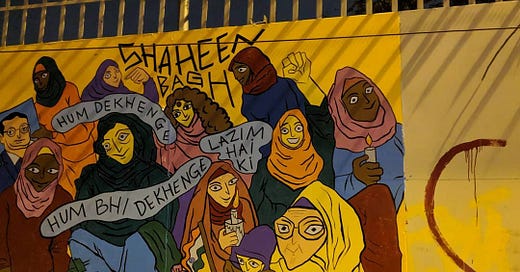


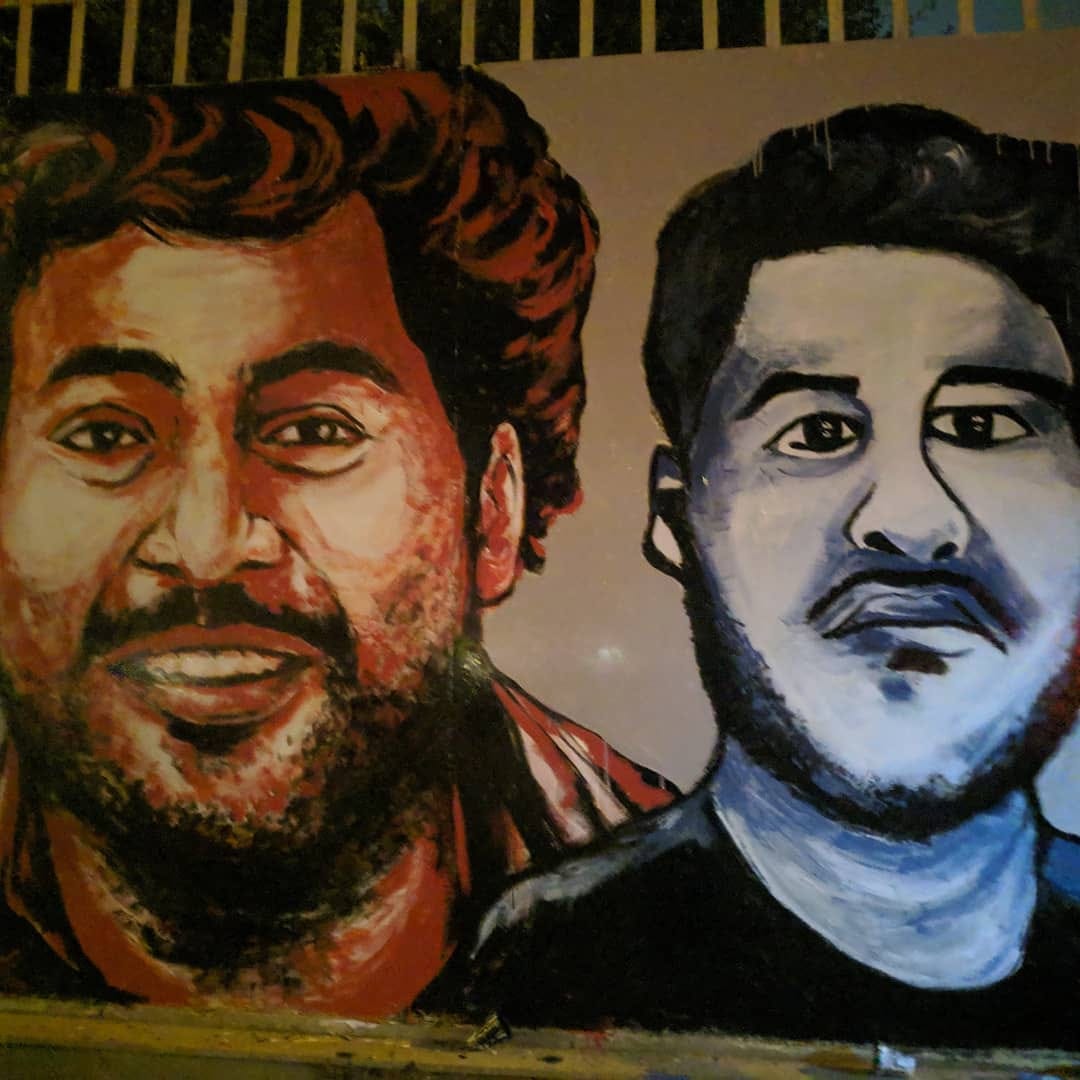
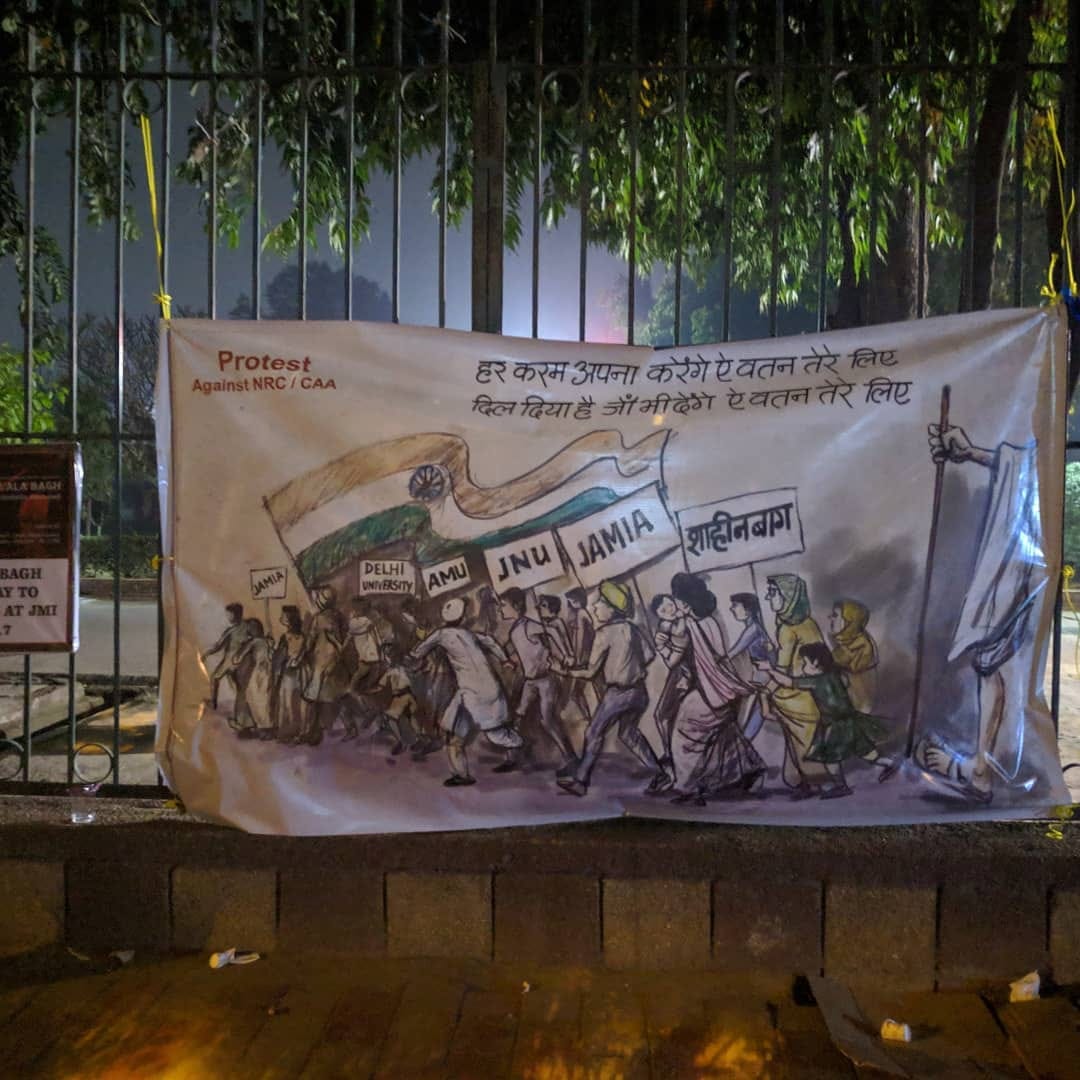

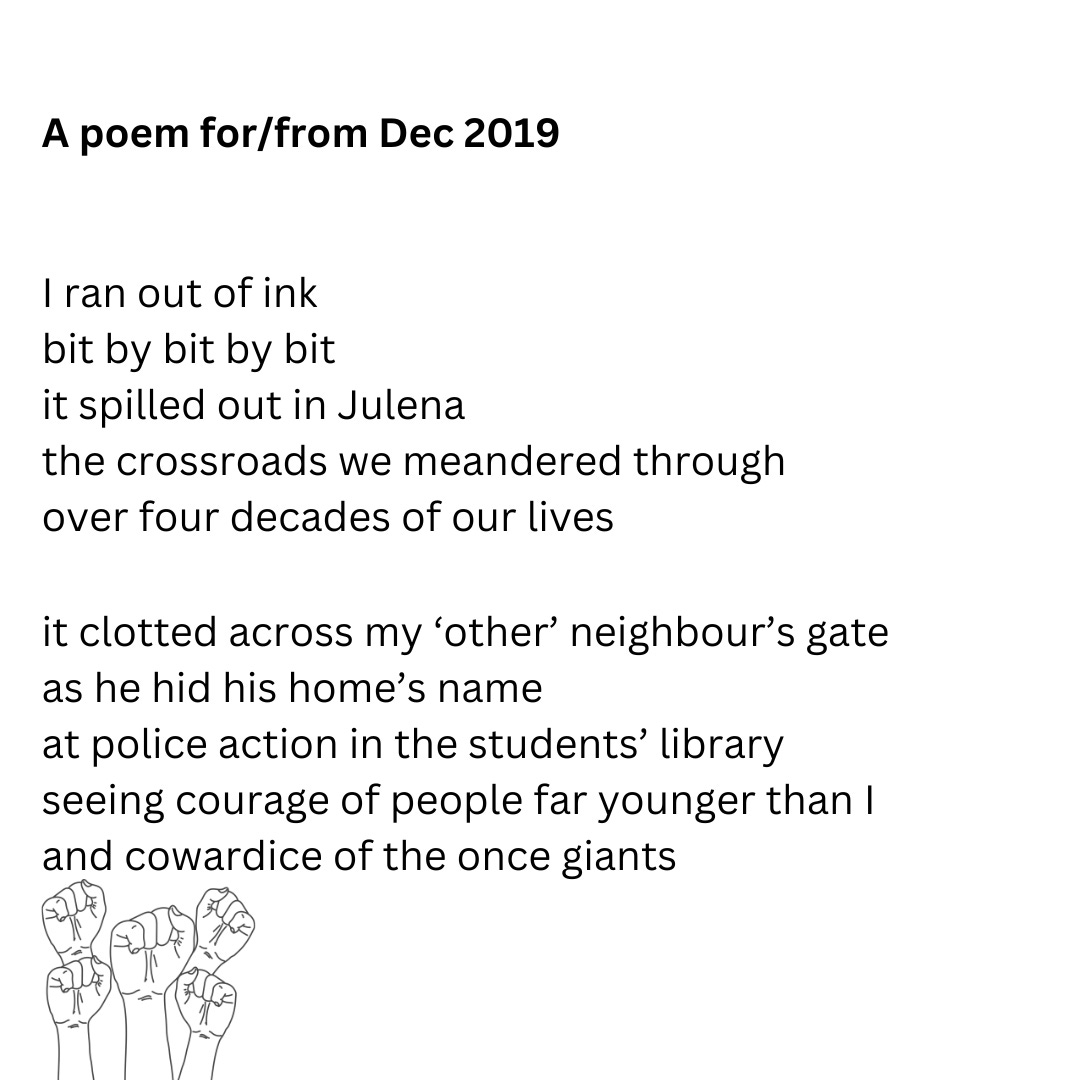
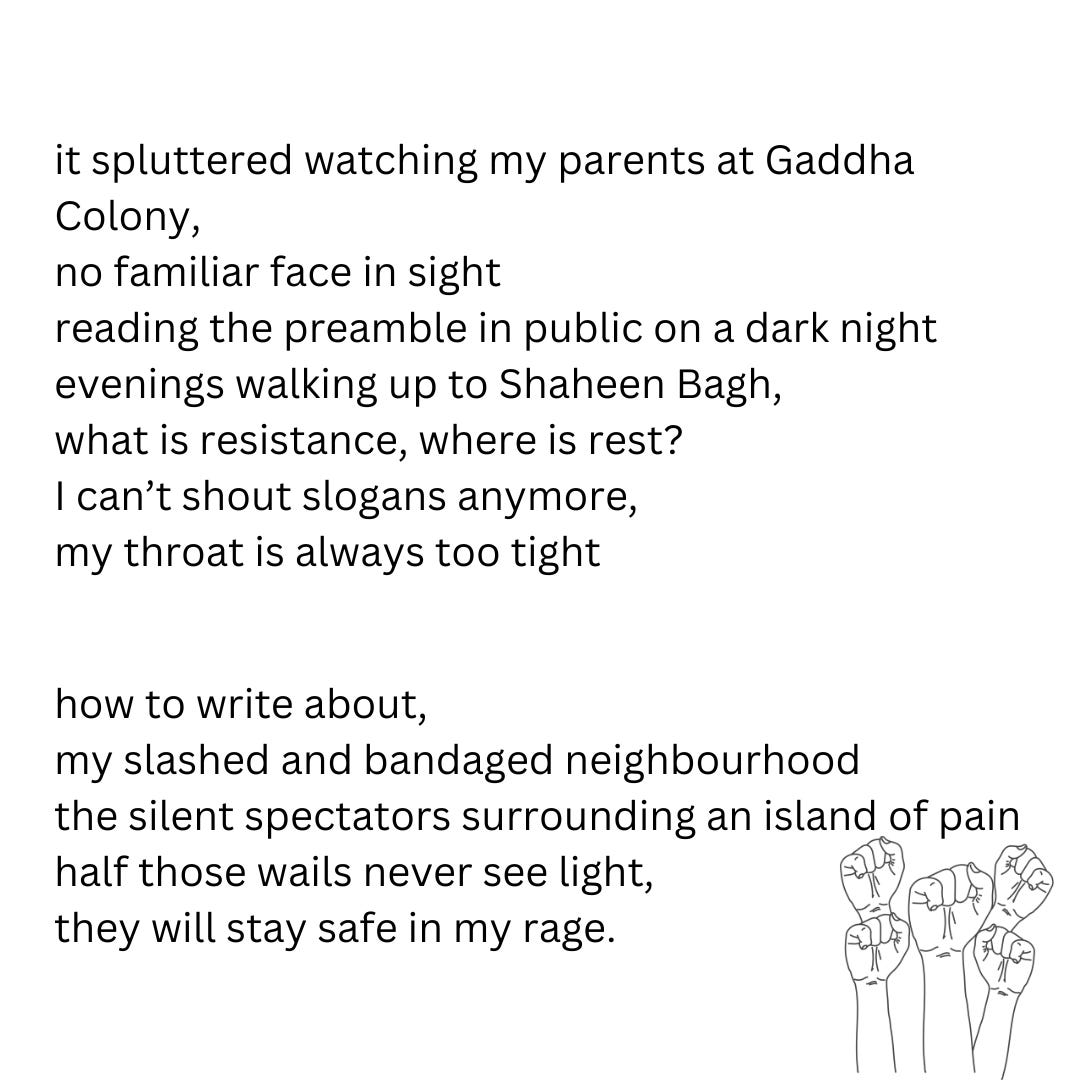
This brought back so many memories of Delhi for me, Roshni. And of that December and the protests that followed. What it means to stand up and be counted as another body on the ground. To say the Preamble out loud. To feel the power of it in a way that was never taught in Civics class in school. This is important, powerful writing. Thank you for it.
And echoing Sanobar- I've missed seeing your name in my inbox and fell upon this!
Yesterday I read aloud Julena meri jaan to my husband and teen daughter. We were on a long drive together. I, of course, cried a couple of times in the second half … voice broke and deep gulps.
The teenager had big tears in her eyes as I finished. I don’t know where it comes from … this sense of belonging and justice. And a fierce need to protect the essential idea of humanity. But it’s there. It’s there naturally in the young ones too.
Roshni, you have come a such long way from your first workshop. Slowly feeling safe and comfortable to allow yourself to be seen. Allow your passions, loves, talents, wounds to be named. You have chosen the path and the path has chosen you 💜